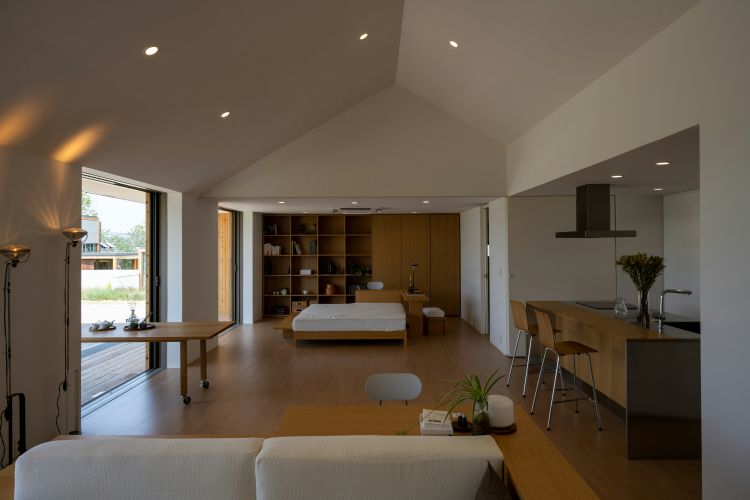In a world driven by constant consumption and the pursuit of more, minimalism offers a refreshing shift—a lifestyle rooted in intentionality and clarity. Rather than focusing on accumulation, minimalism emphasizes what truly matters.
It’s not about living without possessions but about living without excess. By stripping away the nonessential, individuals create space—physically, mentally, and emotionally—for experiences, relationships, and peace of mind.
Minimalism extends beyond aesthetics and organizational trends. It is a philosophical approach to life that helps reduce stress, improve mental clarity, and promote genuine contentment.
Those who embrace it often find their lives filled not with material wealth but with a richness of purpose. From decluttering homes to reevaluating priorities, the minimalist mindset fosters a profound sense of freedom and well-being that many find transformative.
 Professional Support: A Smart Start to Simpler Living
Professional Support: A Smart Start to Simpler Living
Transitioning into a minimalist lifestyle often starts with clearing out excess and making intentional decisions about what truly matters. Whether downsizing or relocating to begin fresh, the process can quickly become overwhelming without proper support. While minimalism emphasizes simplicity, getting there usually requires navigating some chaos first—unless the right help is in place.
A stress-free move, especially across long distances, really only happens when working with the best nationwide moving company. With experienced hands managing the packing, logistics, and heavy lifting, there’s more space—literally and mentally—to focus on letting go of the nonessential.
Instead of being consumed by the physical demands of moving, individuals can begin their minimalist journey with clarity, order, and peace of mind.
Redefining Priorities Through Decluttering
A foundational principle of minimalism is reassessing what truly serves a purpose. Most people accumulate items over time—some out of necessity, others out of sentiment, and many purely by habit. Decluttering requires honest evaluation and emotional detachment. The goal is not to get rid of everything but to retain only those possessions that hold utility or joy.
This practice is more than tidying up. It challenges individuals to reflect on their consumption patterns and emotional dependencies. Minimalism asks: Why is this item being kept? Is it essential? Does it contribute positively to daily life?
Through these questions, people begin to understand their own behaviors and priorities. What emerges is a space that reflects intentional living, filled with fewer distractions and more meaning.
Minimalist spaces often appear calm, clean, and open, not because they follow a trend, but because they are curated with care. Every item has a purpose. The reduced visual clutter also results in psychological clarity. Studies have shown that people living in uncluttered environments tend to experience lower stress and improved focus, both of which directly enhance well-being.
Financial Relief and Conscious Consumption
Living with less frequently translates into spending less. Minimalists prioritize needs over wants, curbing impulsive buying and reducing financial strain. Instead of frequent shopping, they invest in durable, multipurpose items that serve long-term needs. This change in habit encourages a sustainable and thoughtful approach to spending.
As individuals grow more conscious of how and where they spend, they often discover newfound financial freedom. Expenses drop, savings increase, and the stress associated with debt or paycheck-to-paycheck living diminishes. For many, minimalism becomes a key to achieving financial stability and long-term security, not through higher income, but through smarter management of what they already have.
This financial breathing room creates room for deeper life investments—time with family, creative pursuits, and personal development. It’s a shift from material to meaningful, reinforcing the idea that well-being thrives not in excess but in intentionality.
Emotional and Mental Liberation
Possessions can be emotionally burdensome. Items tied to painful memories, guilt, or obligation weigh more than their physical form. Minimalism gives individuals permission to let go. This release is not about forgetting but about healing. Letting go of the past opens the door to the present.
Moreover, the mental clarity that comes with owning less is profound. Fewer possessions mean fewer choices, which reduces decision fatigue. The brain, no longer overloaded by trivial options, can redirect its energy toward creative and productive endeavors.
This mental space encourages introspection and growth. Many minimalists report increased emotional resilience and self-awareness. By reducing external noise, internal clarity is achieved. With fewer distractions, it’s easier to identify personal values and pursue goals aligned with them.
Strengthening Relationships and Social Connections
Minimalism places a high value on relationships. When life is no longer centered on material gain or managing excess, attention naturally turns to people and shared experiences. Time spent maintaining, cleaning, or shopping for things is replaced by time spent with loved ones, nurturing bonds that support emotional well-being.
It also creates opportunities for generosity. By letting go of excess, many find joy in donating useful items or sharing what they have. This fosters a sense of connection to the community and cultivates empathy. When life is simplified, the richness of human connection becomes more visible and valued.
Additionally, minimalist living often inspires better communication. Without the clutter of constant noise—digital or physical—conversations become more focused and intentional. This quality time enhances mutual understanding and emotional depth in relationships.
Healthier Habits and Routines
A simplified space often leads to simplified routines. Cluttered environments can interfere with daily habits and productivity. When everything has its place and life is less hectic, it’s easier to adopt healthy habits—meal prepping, exercise, adequate sleep, and self-care all become more manageable.
Many minimalists adopt intentional routines that support their physical and mental health. Rather than rushing through chaotic mornings or stressful evenings, their days are structured around mindful activities. Minimalism doesn’t eliminate responsibilities but enables them to be handled more efficiently. Some also do their minimalist stuff while making sure they are mentally stable by visiting professionals, like a mental health therapist in Campbell CA.
This newfound rhythm reduces stress hormones, improves sleep quality, and fosters a more relaxed pace of life. The predictability and control gained from such routines contribute directly to an enhanced sense of well-being.
Environmental Benefits and Sustainable Living
Minimalism aligns with sustainability. Consuming less means reducing demand for mass production, which in turn lessens environmental impact. Minimalists often opt for reusable goods, limit waste, and support ethical brands that prioritize eco-conscious practices.
While the focus of minimalism is personal well-being, its ripple effects are far-reaching. Choosing to live with less contributes to a healthier planet—less pollution, fewer landfills, and more mindful consumption patterns. This alignment with environmental values adds to the emotional satisfaction and purpose of minimalist living.
Living with less also reduces the energy required to maintain and store possessions. Smaller homes, fewer gadgets, and minimal decor lead to lower energy usage, decreased water consumption, and a lighter carbon footprint.
Minimalism is not a restriction—it is liberation. Living with less clears away the physical and mental clutter that hinders personal growth and well-being. It encourages clarity, focus, and purpose. By prioritizing what matters most, individuals create room for peace, joy, and connection.
Through mindful choices and intentional living, minimalism enhances every facet of life. It redefines success not by what is owned but by the freedom, health, and happiness that come from letting go.
